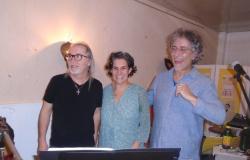Album / Republic of Music / 24.01.2025
Post punk noise
Brutally, the imitation of a regular but too precipitated breathing, as an anxious arrival of something terrible, which is not long in manifesting itself: a first electric surge, then a more deafening second, amplified again and again until ‘To become appalling, as if all of a sudden a veil was torn apart to let the reality of a world arise in the process of collapsing. Pure amazement. Wherever we are at the time of listening, V70the instrumental introduction of Never Exhalethe new album of Ditzleaves the impression that hell has opened in front of us. The Great Regression Still resonate in our ears – how to get bored of such a monument, with so unique savagery? -, and we cannot help but, by launching the second album of the group from Brighton, to fear the disappointment. The 2 minutes 16 of the start sweep away all apprehension to allow the certainty of an upcoming cataclysm, an incredible excess in the uncompromising revelation both of all our current torments but also forces that allow us that allow us that allow us that allow us that allow us that allow us to face it. We know that the rest will be violent, eaten away by anxiety and disgust for what we have all become -psychologically, socially, politically, spiritually -, but we also press a power to come, of those who, because because ‘They assume the real, make its metamorphosis possible. And it is in this sense that Never Exhale is a simply titanic work, standing in the field of ruins of Western civilization to reveal not only its extent, but also the means to create something new with these flaps of a world in agony. More than once, listening to the ten titles that constitute it, we say that this album goes very far, too far – it has no breathing – but that, always, we are ready to follow it in His excesses, totally captivated by his mad determination, his inflexible will to immerse himself in chaos in search of a new order. ‘I wanted to paint the cry rather than the horror‘declared Francis Bacon; With say, we will be entitled to cry and horror.
Brighton’s quintet mobilizes here, again but with tenfold efficiency, its relentless rhythmic – of which we can even better heavily and devastating power on stage – but also this extraordinary combination of electronic elements and guitars sounding sometimes like Surgeon instruments intended to cut the flesh with precision, sometimes as demolition tools, type pierce, chisel or breeze. What sounds new is rather the voice of Cal Francis, sometimes calmly resigned or coldly descriptive, often driven by the chasm by its howls, which we do not know well if they are desperate or combative. The leader of Ditz here performs fascinating vocal performances, nuancing his song by passing him from the explosiveness that we already know to a sort of disturbing spoken word allowing him to bring out the rough grains of his voice. These variations help to make Never Exhale A powerfully embodied work. It is also one of the most striking aspects of this disc to allow a particularly striking physical presence to assert itself: each sound, each word pronounced, sung or shown revealing an intense relationship to the body. The flesh is alive, the bones cracks or seem to confuse, the blood piles, bubbles or gushes. There is a monstrous and unleashed organic mass there in its different manifestations, which is expressed with amazing force.
Thus, the diabolical yo-yo of Taxi man May make you dance, but the violence of the movements produced undermines the joints, threatens the body of dismemberment. Immediately afterwards, it is continuous acceleration, completely demented, of Space/Smile which gives the impression of being in a rocket tearing the terrestrial gravity to set off towards the unknown, except that the race stops suddenly and inexplicably to make room for an infernal triad combining devastating industrial groove and Moments of pure rage leading to the gates of madness. Sinister Lord sees his overwhelming initial confession (‘I feel like a dog in a car in summer‘, among other desperate sentences) to switch to a trance as unhealthy as it is frantic. Fourthe most badly dancing song of the album, mismanages us and shakes us merciless. Finally, God On A Speed Dialwith its projection effects even more cracked than the previous ones, increases the level of intensity from a notch to stop suddenly and inexplicably, at its peak. As with Space/Smileand as he had often done on his first album, say plays with the nerves of his listeners, cuts them in their momentum by provoking what is necessary to frustration for, disoriented, to force them to question in order to Reorient yourself.
-After this particularly cathartic moment, accumulating the most disturbing and hysterical bangers that the group has composed, takes place a rocking: the tempo undergoes much more variations, with slower moments but not necessarily more serene, inhabited as they are by a deaf threat. Smells Like Something Died in Hereundoubtedly the most scary title of the album, presents an atmosphere of desolation, haunted by what is disappeared and pending a future horror. We pass faster on Wheeleronly (relative) weakness of Never Exhaleto achieve what is probably its summit, The Body As A Structure. The first part of the song clinically exposes a relationship to the body not determined by its organic constitution, against the backdrop of metallic rattling recalling the surgical universe, and revealing everyone’s ability to act on the forces that cross us to physically reorganize us. Then, the second part increases the beautiful and painful melody, unusual at Ditz, in intensity, making Calcis ‘admission even more poignant:’And while I put my face in light, I hang on to horror‘. Finally, the electric hurricane returns, triggering a frightening enjoyment which we do not know if it frees anything or precipitates in a new torment. Britneyto finish, stretches first slowly, a deep voice glued to our ear, before the guitar, repetitive, heavy and hypnotic, gradually gained in power to expel the last gust of the album, until the return of A silence that has never seemed so noisy, leaving us with this disaster observation: ‘We build … we failed, we have given up‘.
Never Exhale Performs the incredible tour de force to offer an sound equivalent to the unprecedented hostility of our time while revealing the immense destruction potential that accompanies it. Our collective reality and its consequences on an individual scale are exposed, there, in the most raw way which is, with, overlooking it and enveloping it, the dreadful dark mass of all the abominations which result from it. Hence this impression that never leaves us, listening to these ten essential pieces, to be in the presence of something foolish in his black immensity, in the heart of which nevertheless arises the mi whirling voice, mi -ruscutating Calcis, a kind of modern pythia inspiring a strange confidence, as if by agreeing to dive with it in the maelstrom we thought we could find the conditions of a new order of things. Never Exhale undoubtedly burst the singularity of Ditz, attracting everything that is approaching its orbit to engage it in its deep darkness, however infinitely more frequentable than those which surround us more and more every day and, who knows, covering a light for ‘Moment still undetestable.






